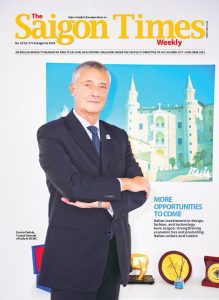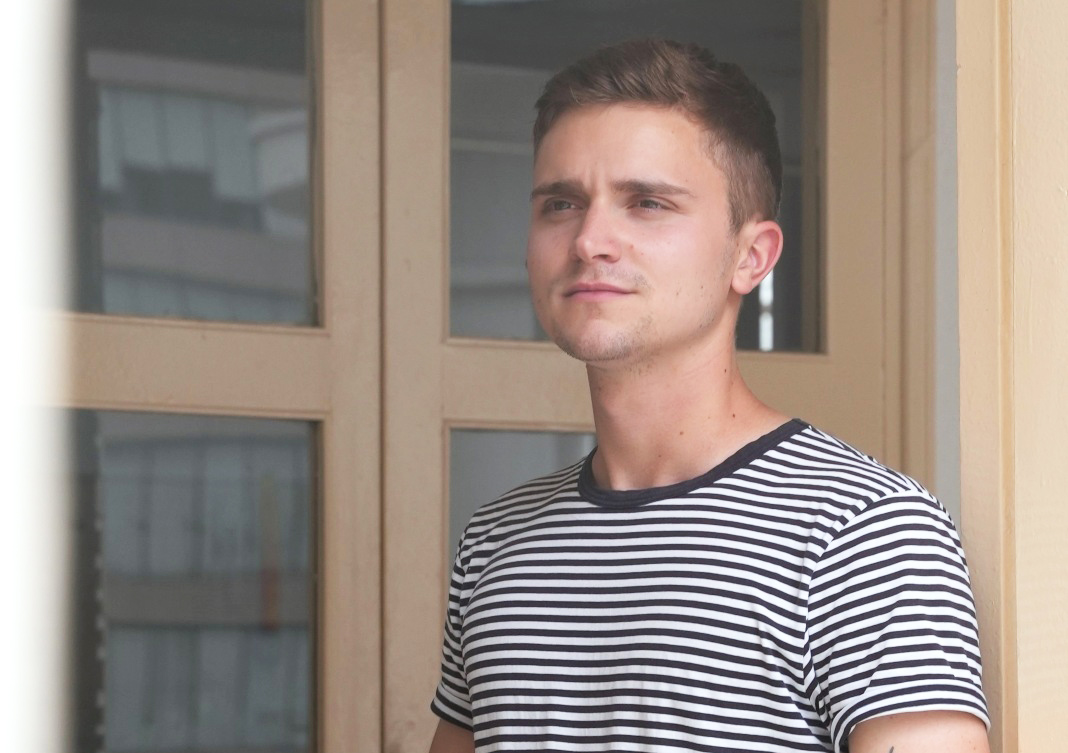Six years ago, an 18-year-old man set foot in Vietnam for the first time. What began as a simple travel experience soon turned into an inspiration to write about the country. In an interview with The Saigon Times, Liam Greenwell, a U.S. citizen, shares his journey exploring Vietnam and its people before embarking on a new chapter in his life—a PhD program in anthropology.
The Saigon Times: Have you noticed any changes since your last visit six years ago?
Liam Greenwell: I have noticed that many things have stayed the same. Vietnamese food is still the greatest in the world, and I am happy to see so many of my favorite food stalls still exist. Neighborhoods like Da Kao are still really lovely and wonderful. The traffic is still wild and chaotic, just as I remember. But there are also so many changes. I see young people starting their own businesses, opening up new cafes and restaurants. It’s amazing how much more internationally minded everyone seems to be now. I also know the metro lines are set to open soon, and it feels like there’s a real sense of opportunity here in Saigon and throughout Vietnam.
How does your real experience traveling in Vietnam compare with your research and write-up about the country?
When I wrote many of those articles six years ago, it was a different time. I focused on Vietnamese culture, art, film, and music—topics that often don’t make the headlines. Still, they are incredibly important, especially to the young people here. If you look a little deeper, you’ll find a lot of exciting things happening that aren’t getting the attention they deserve.
Why Vietnam?
I’ve spent a lot of time in other places like India and Mexico, building connections around the world. But something about Vietnam keeps drawing me back. I remember my very first visit to this country. I was just 18, traveling alone, and I crossed the border on a speedboat from Phnom Penh, Cambodia, to Chau Doc in An Giang Province. As soon as I stepped off the boat, I felt so connected to the place. Sitting there, watching the motorbikes whiz by, it felt like a home away from home in many ways.

What inspired you to delve into exploring such topics?
I’ve always known that I wanted to do something academic and in-depth. There’s a seriousness that comes with work backed by solid research. I think having a background in various topics, theories, and extensive reading can significantly enrich the depth of your work. The key, however, is to ensure that you know what you’re talking about and have that academic foundation while also making your work accessible. So much of what we do, whether it’s journalistic or academic, loses its value if people can’t understand it. It all comes down to communication and figuring out how to connect with people.
What first inspired you to become a writer?
I think I was always writing. I was reading before I could speak. It took me a long time to learn how to speak. Maybe that’s why I feel much more comfortable with the written word. But embracing writing fully took a while, and it really came down to the encouragement of others. I believe this is true for many people in different careers. When someone sees potential in you, tells you what you’re doing well, offers ways to improve, or mentors you, it makes a huge difference. In fact, it’s something that I found at Vietcetera, where a few older writers took me under their wing and taught me how to write for a publication.
How about teaching?
Teaching is something I sort of fell into, but I think every teacher has been inspired by teachers from their past. For me, it was a high school teacher named Mr. Jordan who changed the way I thought about writing and teaching. His approach was different from anything I had experienced before. He showed me that writing could be a creative exercise and that teaching could be more than just telling people what to believe.
When did you decide to become an anthropologist?
For me, pursuing anthropology feels like the perfect culmination of everything I love to do. Being an anthropologist allows me to teach, write, and do research for a living. That’s exactly what I want to do. It suits me better than being a journalist or a freelance writer. Freelancing, with its constant rush for commissions and writing for various publications, just doesn’t fit me at the end of the day. Committing to an anthropology PhD program means dedicating at least six years, probably seven or eight, to intensive study and research. It’s a long journey with no guarantees about what will happen at the end. But despite uncertainties, this path feels right for me, combining my passions and aligning with my strengths.
How will you prepare financially for this program?
The program I’m entering actually provides a stipend, which makes the financial aspect much more manageable. It’s almost like having a job because I’ll be teaching as part of my studies. In a way, it’s like being a student and already training to be a professor at the same time. I’ll receive a salary, which definitely eases the financial burden.
What is the most interesting part of becoming an anthropologist?
Though I love different countries around the world, my primary focus will be on studying the United States. This might seem unusual because, historically, anthropologists from the United States and Europe have gone out to places like India, Africa, and the Pacific Islands, which are the traditional domains of anthropology. But the discipline has a long history of being intertwined with colonialism and can create power imbalances between the anthropologists and those being studied. So, I’m interested in using the tools I’ve learned from studying other cultures to examine my own country and push against that legacy.
 You mentioned being an introvert. So, how do you plan to prepare yourself for this new job?
You mentioned being an introvert. So, how do you plan to prepare yourself for this new job?
I think I’m good with people, but I still need a place to recover after spending a lot of time with them! I get a lot of value from my interactions with other people. So perhaps being an anthropologist is simply an excuse to meet new people and learn. I believe it also comes from political commitments to build solidarity and connections not only within our own countries but also across borders. So maybe being an anthropologist is just a way to force myself to do it, but I enjoy it as well.
It seems likely that you’ll be traveling a lot to observe people once you finish school. How do you feel about this?
I believe that’s correct, and one of the exciting aspects of my future career is the chance to engage in projects across various field sites. Perhaps I’ll have one in the United States, or maybe I’ll return to Vietnam for another. Throughout my life, I’ve always been on the move, constantly traveling and exploring new places. It’s likely that this trend will continue into my future job. But that’s what I’ve done in my adult life anyway. After graduating from college, I planned to return to Vietnam, but due to the COVID-19 pandemic, I found myself in Chicago for a year. Then I relocated to Mexico City and learned Spanish. Over the past eight months, I’ve embarked on extensive travels to countries like Kazakhstan and Georgia, expanding my understanding of other parts of the world. Despite the nature of my current situation, there’s a silver lining. My recent work in writing allows me to work from different places and do a lot of writing. While I look forward to more stability when I enter my program in the fall, I anticipate that my journey will still involve plenty of movement and exploration.
Reported by The Ky









